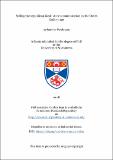Files in this item
Selling the republican ideal : state communication in the Dutch Golden Age
Item metadata
| dc.contributor.advisor | Pettegree, Andrew | |
| dc.contributor.author | der Weduwen, Arthur | |
| dc.coverage.spatial | xxi, 352 p. | en_US |
| dc.date.accessioned | 2018-12-03T13:53:38Z | |
| dc.date.available | 2018-12-03T13:53:38Z | |
| dc.date.issued | 2018-12-07 | |
| dc.identifier.uri | https://hdl.handle.net/10023/16612 | |
| dc.description.abstract | This study seeks to describe the public communication practices of the authorities in the Dutch Golden Age. It is a study of ‘state communication’: the manner in which the authorities sought to inform their citizens, publicise their laws, and engage publicly in quarrels with their political opponents. These communication strategies underpinned the political stability of the seventeenth-century Dutch Republic. Concerned about their decorous appearance, the regents who ruled the country always understated the extent to which they relied on the consent of their citizens. The regents shared a republican ideal which dismissed the agency of popular consent; but this was an ideal, like so many ideals in the Dutch Republic, which existed in art and literature, but was not practised in daily life. The practicalities of governance demanded that the regents of the Dutch Republic adopt a sophisticated system of communication. The authorities employed town criers and bailiffs to speed through town and country to repeat proclamations; they instructed ministers to proclaim official prayer days at church; and they ensured that everywhere, on walls, doors, pillars and public boards, one could find the texts of ordinances, notices and announcements issued by the authorities. In the seventeenth-century Dutch Republic, politics was not the prerogative of the few. That this was due to the determined efforts of the authorities has never been appreciated. Far from withholding political information, the regents were finely attuned to the benefit of involving their citizens in the affairs of state. The Dutch public was exposed to a wealth of political literature, much of it published by the state. The widespread availability of government publications also exposed the law to prying, critical eyes; and it paved the way to make the state, and the bewildering wealth of legislation it communicated, more accountable. | en_US |
| dc.language.iso | en | en_US |
| dc.publisher | University of St Andrews | |
| dc.subject | Dutch Republic | en_US |
| dc.subject | Seventeenth century | en_US |
| dc.subject | Politics | en_US |
| dc.subject | Communication | en_US |
| dc.subject | en_US | |
| dc.subject | Government publications | en_US |
| dc.subject | Dutch Revolt | en_US |
| dc.subject | Legislation | en_US |
| dc.subject | Pamphlets | en_US |
| dc.subject | Broadsheets | en_US |
| dc.subject.lcc | DJ146.D4 | |
| dc.subject.lcsh | Netherlands--Politics and government--1556-1648 | en |
| dc.subject.lcsh | Netherlands--History--Eighty Years' War--1568-1648 | en |
| dc.subject.lcsh | Government communication systems--Netherlands--History | en |
| dc.subject.lcsh | Government publications--Netherlands--History--16th century | en |
| dc.subject.lcsh | Political culture--Netherlands--History--16th century | en |
| dc.title | Selling the republican ideal : state communication in the Dutch Golden Age | en_US |
| dc.type | Thesis | en_US |
| dc.contributor.sponsor | University of St Andrews. School of History | en_US |
| dc.type.qualificationlevel | Doctoral | en_US |
| dc.type.qualificationname | PhD Doctor of Philosophy | en_US |
| dc.publisher.institution | The University of St Andrews | en_US |
| dc.publisher.department | School of History | en_US |
| dc.rights.embargoreason | Embargo period has ended, thesis made available in accordance with University regulations | en |
| dc.identifier.doi | https://doi.org/10.17630/10023-16612 |
This item appears in the following Collection(s)
Items in the St Andrews Research Repository are protected by copyright, with all rights reserved, unless otherwise indicated.

